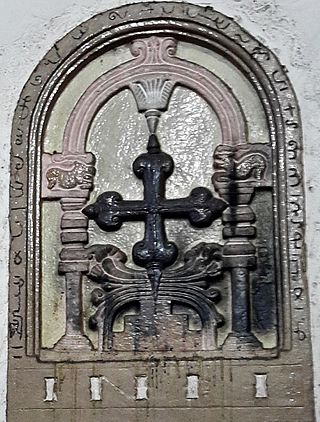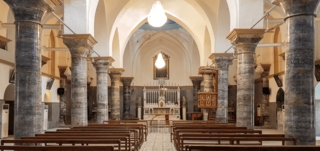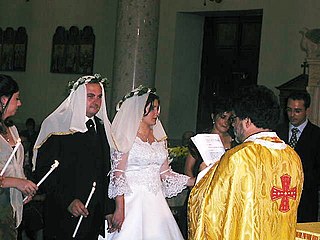
Vespers is a liturgy of evening prayer, one of the canonical hours in Catholic, Eastern Orthodox, Oriental Orthodox, and Lutheran liturgies. The word for this prayer time comes from the Latin vesper, meaning "evening".

In the practice of Christianity, canonical hours mark the divisions of the day in terms of fixed times of prayer at regular intervals. A book of hours, chiefly a breviary, normally contains a version of, or selection from, such prayers.

The Saint Thomas Christians, also called Syrian Christians of India, Marthoma Suriyani Nasrani, Malankara Nasrani, or Nasrani Mappila, are an ethno-religious community of Indian Christians in the state of Kerala, who, for the most part, employ the Eastern and Western liturgical rites of Syriac Christianity. They trace their origins to the evangelistic activity of Thomas the Apostle in the 1st century. The Saint Thomas Christians had been historically a part of the hierarchy of the Church of the East but are now divided into several different Eastern Catholic, Oriental Orthodox, Protestant, and independent bodies, each with their own liturgies and traditions. They are Malayalis and their mother tongue is Malayalam. Nasrani or Nazarene is a Syriac term for Christians, who were among the first converts to Christianity in the Near East.

The Gloria Patri, also known in English as the Glory Be to the Father or, colloquially, the Glory Be, is a doxology, a short hymn of praise to God in various Christian liturgies. It is also referred to as the Minor Doxology(Doxologia Minor) or Lesser Doxology, to distinguish it from the Greater Doxology, the Gloria in Excelsis Deo.

The Syro-Malabar Church, also known as the Syro-Malabar Catholic Church, is an Eastern Catholic church based in Kerala, India. It is a sui iuris (autonomous) particular church in full communion with the Holy See and the worldwide Catholic Church, with self-governance under the Code of Canons of the Eastern Churches (CCEO). The major archbishop presides over the entire church. The incumbent Major Archbishop is Raphael Thattil, serving since January 2024. It is the largest Syriac Christian church and the largest Eastern Catholic church. Syro-Malabar is a prefix reflecting the church's use of the East Syriac liturgy and origins in Malabar. The name has been in usage in official Vatican documents since the nineteenth century.

The Chaldean Catholic Church is an Eastern Catholic particular church in full communion with the Holy See and the rest of the Catholic Church, and is headed by the Chaldean Patriarchate. Employing in its liturgy the East Syriac Rite in the Syriac dialect of the Aramaic language, it is part of Syriac Christianity. Headquartered in the Cathedral of Our Lady of Sorrows, Baghdad, Iraq, since 1950, it is headed by the Catholicos-Patriarch Louis Raphaël I Sako. In 2010, it had a membership of 490,371, of whom 310,235 (63.27%) lived in the Middle East.

Syriac Christianity is a branch of Eastern Christianity of which formative theological writings and traditional liturgies are expressed in the Classical Syriac language, a variation of the old Aramaic language. In a wider sense, the term can also refer to Aramaic Christianity in general, thus encompassing all Christian traditions that are based on liturgical uses of the Aramaic language and its variations, both historical and modern.
Christian liturgy is a pattern for worship used by a Christian congregation or denomination on a regular basis. The term liturgy comes from Greek and means "public work". Within Christianity, liturgies descending from the same region, denomination, or culture are described as ritual families.

The Holy Qurbana, refers to the Eucharistic liturgy as celebrated in Syriac Christianity and the liturgical books containing the rubrics for its celebration. Churches that celebrate this liturgy include various descendants of the Church of the East. East Syriac Christianity consists of an Edessan liturgical rite called the East Syriac Rite. The major anaphora of the East Syriac tradition is the Holy Qurbana of Saints Addai and Mari; Addai being a disciple of Thomas the Apostle and Mari being Addai's disciple. These churches are primarily based in the Middle East and India, with diasporic communities settled in the western world.

The Synod of Diamper (Udayamperoor Synod) (Malayalam: ഉദയംപേരൂർ സൂനഹദോസ്, romanized: Udayampērūṟ Sūnahadōs), held at Udayamperoor (known as Diamper in non-vernacular sources) in June 1599, was a diocesan synod, or council, that created rules and regulations for the ancient Saint Thomas Christians (also known as Mar Thoma Nasranis) of the Malabar Coast, a part of modern-day Kerala state, India, formally subjugating them and downgrading their whole Metropolitanate of India as the Diocese of Angamale, a suffragan see to the Archdiocese of Goa administered by Latin Church Padroado missionaries. This synod also introduced forced Liturgical Latinisation and the eschewal of local practices and beliefs, leading to a significant ecclesial protest by Saint Thomas Christians known as Coonan Cross Oath and a subsequent schism in the mid-17th century.

The Epiphany season, also known as Epiphanytide or the time of Sundays after Epiphany, is a liturgical period, celebrated by many Christian Churches, which immediately follows the Christmas season. It begins on Epiphany Day, and ends at various points as defined by those denominations. The typical liturgical color for the day of Epiphany is white, and the typical color for Epiphany season is green.
Joseph J. Palackal, C.M.I. is an Indic musicologist, singer and composer, with special interests in the musical traditions of the Indian Christians and a Syro-Malabar Catholic priest. He is also the Founder-President of the Christian Musicological Society of India.

The Chaldean Syrian Church of India is an Eastern Christian denomination, based in Thrissur, in India. It is organized as a metropolitan province of the Assyrian Church of the East, and represents traditional Christian communities of the East Syriac Rite along the Malabar Coast of India. It is headed by Mar Awgin Kuriakose.
Nones, also known as None ("Ninth"), the Ninth Hour, or the Midafternoon Prayer, is a fixed time of prayer of the Divine Office of almost all the traditional Christian liturgies. It consists mainly of psalms and is said around 3 pm (15:00), about the ninth hour after dawn.

The West Syriac Rite, also called the Syro-Antiochian Rite and the West Syrian Rite, is an Eastern Christian liturgical rite that employs the Divine Liturgy of Saint James in the West Syriac dialect. It is practised in the Maronite Church, the Syriac Orthodox Church, the Syriac Catholic Church and various Malankara Churches of India. It is one of two main liturgical rites of Syriac Christianity, the other being the East Syriac Rite. It originated in the ancient Patriarchate of Antioch. It has more anaphoras than any other rite.

The East Syriac Rite, or East Syrian Rite, is an Eastern Christian liturgical rite that employs the Divine Liturgy of Saints Addai and Mari and utilizes the East Syriac dialect as its liturgical language. It is one of the two main liturgical rites of Syriac Christianity, along with the West Syriac Rite.
The Malankara Rite is the form of the West Syriac liturgical rite practiced by several churches of the Saint Thomas Christian community in Kerala, India. West Syriac liturgy was brought to India by the Syriac Orthodox Bishop of Jerusalem, Gregorios Abdal Jaleel, in 1665; in the following decades the Malankara Rite emerged as the liturgy of the Malankara Church, one of the two churches that evolved from the split in the Saint Thomas Christian community in the 17th century. Today it is practiced by the various churches that descend from the Malankara Church, namely the Malankara Mar Thoma Syrian Church, Malankara Orthodox Syrian Church, the Jacobite Syrian Christian Church, the Syro-Malankara Catholic Church and the Malabar Independent Syrian Church.

The Holy Qurobo or Holy Qurbono refers to the Eucharist as celebrated in Syro-Antiochene Rite and the liturgical books containing rubrics for its celebration. West Syriac Rite includes various descendants of the Oriental Orthodox and Eastern Catholic churches. It consists of two distinct liturgical traditions: the Maronite Rite, and the Jacobite Rite. The major Anaphora of both the traditions is the Divine Liturgy of Saint James in Syriac language. The Churches are primarily based in the Middle East, Africa, and India.
The Eastern Catholic Churches of the Catholic Church utilize liturgies originating in Eastern Christianity, distinguishing them from the majority of Catholic liturgies which are celebrated according to the Latin liturgical rites of the Latin Church. While some of these sui iuris churches use the same liturgical ritual families as other Eastern Catholic churches and Eastern churches not in full communion with Rome, each church retains the right to institute its own canonical norms, liturgical books, and practices for the ritual celebration of the Eucharist, other sacraments, and canonical hours.

The Mystery of Crowning is a ritual component of the sacrament of marriage in Eastern Christianity. Variations of the crowning ceremony exist in multiple liturgical rites, including the Byzantine, Coptic, West Syriac, and East Syriac Rites of the Eastern Orthodox, Oriental Orthodox, and Eastern Catholic Churches. The crowning ceremony typically features a crown being placed upon the head of both the bride and bridegroom, crowning them as the queen and king of a new family.












